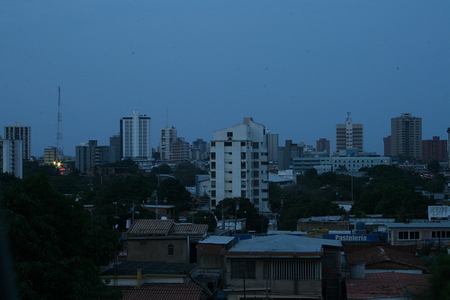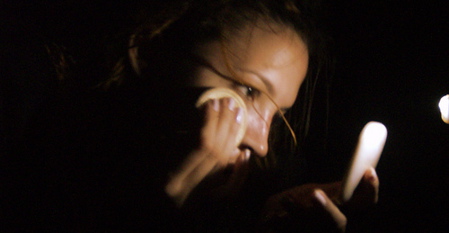More than 13 states and the most important cities of Venezuela were affected by a power outage last Tuesday, leaving many without electricity for several hours [es]. The subway system of the capital city of Caracas collapsed and left thousands of people having to walk through city streets already crowded with vehicles (photos). In spite of the difficulties, some bloggers were able to record some thoughts on the day's events through Twitter and their blogs, even though internet service remained slow in those places that still had electricity. Even cell phone service was unable to meet the demand throughout the emergency.

Photo by Benitex and used with permission
The power outage has yet to be explained by the authorities, and during the past weeks there has been a series of protests over the power outages in the western and southern part of the country. The fluctuation of voltage has affected electrical appliances, television sets and refrigerators in those houses without surge protection. As seen in this news article [es], a protestor asks, “now, who will pay for my television?” Venezuela contains a giant network of hydroelectricity that provides energy to the entire country via companies that have been recently criticized by the government. The process of “state-ization” of those services that the government considers “strategic” for national soverignty has also been criticized because neither the quality of the service, nor the maintenance of the service has been guaranteed. The country is going through a national phenomenon that points things in that direction, and it reveals the system's capacity to control emergencies.
Álvaro Rafael of Planeta en Fuego [es] indigently analyzes the responsibildiad about the power outage and the political discourse:
Si este apagón hubiera ocurrido estando las empresas eléctricas en manos de empresas privadas ¿no habría sido «suficiente motivo» para que el Gobierno nacional haya pedido la expulsión de sus dueños privados en beneficio de una supuesta «recuperación nacional»? El apagón ocurrió estando las empresas eléctricas en manos del Estado, ¿no es motivo para que nosotros, los ciudadanos afectados, pidamos la expulsión de quienes nos desgobiernan de tales empresas (y hasta de la administración del Estado)?
If this power outage would have happened when the electric companies were in the hands of private companies, wouldn't it have been enough for the national government to ask for the expulsion of the private owners for a supposed national recuperation? The power outage happened when the electric companies were in hands of the State. Isn't it enough for us, the affected citizens, to ask for the expulsion of those who poorly manage those companies (and even the state administration)?
On the other hand, Carlos García of Carlos Zombie [es] narrates and photographs his experience in his attempt to leave Caracas and get home. Like others, he had to not only deal with the failure of the Caracas metro system, but also had to walk several kilometers to reach one of the bus terminals to take a bus to one of the satellite cities because the electric train was also closed:
al llegar a la hoyada vi que mucha, pero mucha, mucha gente habia tenido la misma idea que yo y llego caminando, por lo que la multitud se incremento a niveles apocalipticos, la falta del tren hace que la hoyada viva momentos de pelicula de zombies. al final me monte en una camioneta a coñazo limpio y fue cuando pude venirme a casa, no sin antes calarme una mamarra cola para salir de ccs.
Reaching the station of La Hoyada, I saw many, many people that had the same idea that I did and arrived walking. The amount of people increased to apocalyptic levels. The lack of trains made the station of La Hoyada look like a zombie movie. At the end, I boarded a truck after pushing and shoving and that is how I made it home, not without standing in a long line to leave the Ccs
JuanCPovE [es] provides a long chronicle of how he had to descend 26 flights without elevator and how he found out about the national situation without radio or TV.
De tanto marcar mi celular logré comunicarme con mi primo ya que en la empresa donde el trabaja mantiene contacto con varias oficinas a lo largo del país y me confirmó que el apagón no sólo había ocurrido en Caracas (¡Rayos!, yo creía que era sólo en una zona de la capital), sino que en otras ciudades del país, posiblemente en toda Venezuela.
After repeatedly dialing my cell phone, I was able to communicate with my cousin. In the company where he works, he is constantly in contact with various offices throughout the country and confirmed that the power outage did not only take place in Caracas. (My goodness! I thought it was only in the capital city), but also in other cities of the country, and possibly all of Venezuela.
In addition to the long hours of standing in traffic, violence in the streets, traffic accidentss, and the general desperation to make it home, other episodes were part of the daily humor when one lives in relaxed socities.
The Twitterosphere had some interesting dialogues between those that followed along via cell phone or on unaffected electric networks:
Jeanfreddy: I am going over to Facebook, where there is light.
Anibal: It is very funny to see an ad of “Motherland, socialismo or death” connected to the system of emergency lights
Juliana B: I am annoyed. How did people live before? I am picking up candles.
Finally, the flickr user MaLu did not let the power outage get in her way of her beauty routine (used with permission):








1 comment